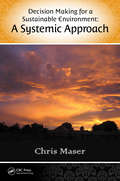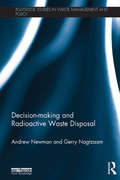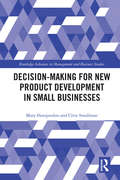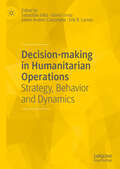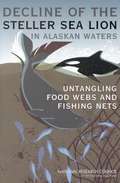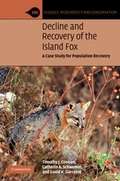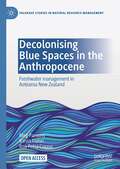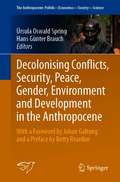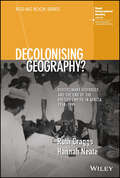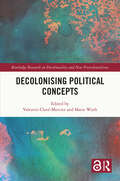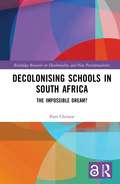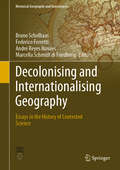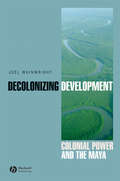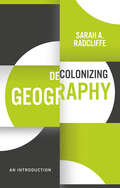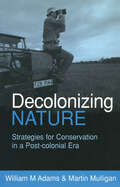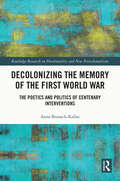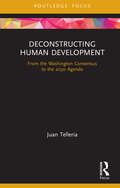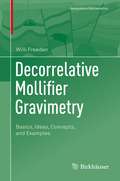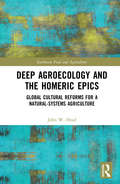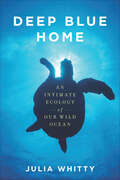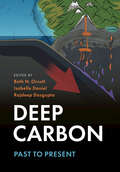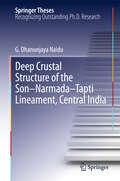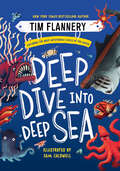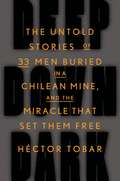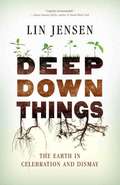- Table View
- List View
Decision-Making for a Sustainable Environment: A Systemic Approach (Social Environmental Sustainability)
by Chris MaserIncreasingly, environmental decision making is like playing a multidimensional game of chess. With interactions between the atmosphere, the litho-hydrosphere, and the biosphere, the game is at once a measure of complexity, uncertainty, interdisciplinary acuity, social-environmental sustainability, and social justice for all generations. As such, it
Decision-making and Radioactive Waste Disposal (Routledge Studies in Waste Management and Policy)
by Gerry Nagtzaam Andrew NewmanThe International Atomic Energy Agency estimates that nuclear power generation facilities produce about 200,000 cubic meters of low and intermediate-level waste each year. Vital medical procedures, industrial processes and basic science research also produce significant quantities of waste. All of this waste must be shielded from the population for extended periods of time. Finding suitable locations for disposal facilities is beset by two main problems: community responses to siting proposals are generally antagonistic and, as a result, governments have tended to be reactive in their policy-making. Decision-making and Radioactive Waste Disposal explores these issues utilizing a linear narrative case study approach that critically examines key stakeholder interactions in order to explain how siting decisions for low level waste disposal are made. Five countries are featured: the US, Australia, Spain, South Korea and Switzerland. This book seeks to establish an understanding of the political, economic, environmental, legal and social dimensions of siting across those countries. This valuable resource fills a gap in the literature and provides recommendations for future disposal facility siting efforts. The book will be of interest to students and scholars of environmental law, justice, management, politics, energy and security policy as well as decision-makers in government and industry.
Decision-making for New Product Development in Small Businesses (Routledge Advances in Management and Business Studies)
by Mary Haropoulou Clive SmallmanWhat goes on in a small firm that lives or dies by its capacity to innovate? How are decisions made on new product development, and how does that feed into the ecological, social and financial sustainability of the firm? This book answers the questions through an in-depth look at a small business that manufactures high-end carpet yarn. Using advanced analytical techniques to interrogate rich qualitative data, the book draws together established theories of decision-making and new product development, coupled with thinking about business sustainability to improve our understanding of this important area of business practice. The book further reinforces the importance and role of organizational learning in organizational decision-making, based on novel analysis of empirically developed qualitative data.
Decision-making in Humanitarian Operations: Strategy, Behavior and Dynamics
by Sebastián Villa Gloria Urrea Jaime Andrés Castañeda Erik R. LarsenThis book brings together research in humanitarian operations, behavioral operations and dynamic simulation. Part I outlines the main characteristics and strategic challenges of humanitarian organizations in preparedness, knowledge management, climate change and issues related to refugees and social inclusion. Part II gives an introduction to behavioral operations and experiments in single- and multi-agent settings, followed by discussions on quantal theory, framing effect and possible applications in the humanitarian sector. Part III introduces system dynamics and agent-based modeling and discusses how these techniques can be used to study dynamics and decision-making in humanitarian operations. This book is unique in providing a holistic view of the decision-making process and challenges in the humanitarian sector.
Decline Of The Steller Sea Lion In Alaskan Waters: Untangling Food Webs And Fishing Nets
by Committee on the Alaska Groundfish Fishery Steller Sea LionsFor an unknown reason, the Steller sea lion population in Alaska has declined by 80 percent during the past three decades. In 2001, the National Research Council began a study to assess the many hypotheses proposed to explain the sea lion decline including insufficient food due to fishing or the late 1970s climate/regime shift, a disease epidemic, pollution, illegal shooting, subsistence harvest, and predation by killer whales or sharks. The report's analysis indicates that the population decline cannot be explained only by a decreased availability of food; hence other factors, such as predation and illegal shooting, deserve further study. The report recommends a management strategy that could help determine the impact of fisheries on sea lion survival--establishing open and closed fishing areas around sea lion rookeries. This strategy would allow researchers to study sea lions in relatively controlled, contrasting environments. Experimental area closures will help fill some short-term data gaps, but long-term monitoring will be required to understand why sea lions are at a fraction of their former abundance.
Decline and Recovery of the Island Fox
by Timothy J. Coonan Catherin A. Schwemm David K. Garcelon Linda Munson Cheri AsaNative only to the California Channel Islands, the island fox is the smallest canid in North America. Populations on four of the islands were threatened to extinction in the 1990s due to human-mediated predation and disease. This is the first account of the natural history and ecology of the island fox, illustrating both the vulnerability of island ecosystems and the efficacy of cooperative conservation measures. It explains in detail the intense conservation actions required to recover fox populations, such as captive breeding and reintroduction, and large-scale ecosystem manipulation. These actions were successful due in large part to extraordinary collaboration among the scientists, managers and public advocates involved in the recovery effort. The book also examines the role of some aspects of island fox biology, characteristic of the 'island syndrome', in facilitating their recovery, including high productivity and an apparent adaptation to periodic genetic bottlenecks.
Decolonising Blue Spaces in the Anthropocene: Freshwater management in Aotearoa New Zealand (Palgrave Studies in Natural Resource Management)
by Karen Fisher Meg Parsons Roa Petra CreaseThis open access book crosses disciplinary boundaries to connect theories of environmental justice with Indigenous people’s experiences of freshwater management and governance. It traces the history of one freshwater crisis – the degradation of Aotearoa New Zealand’s Waipā River– to the settler-colonial acts of ecological dispossession resulting in intergenerational injustices for Indigenous Māori iwi (tribes). The authors draw on a rich empirical base to document the negative consequences of imposing Western knowledge, worldviews, laws, governance and management approaches onto Māori and their ancestral landscapes and waterscapes. Importantly, this book demonstrates how degraded freshwater systems can and are being addressed by Māori seeking to reassert their knowledge, authority, and practices of kaitiakitanga (environmental guardianship). Co-governance and co-management agreements between iwi and the New Zealand Government, over the Waipā River, highlight how Māori are envisioning and enacting more sustainable freshwater management and governance, thus seeking to achieve Indigenous environmental justice (IEJ). The book provides an accessible way for readers coming from a diversity of different backgrounds, be they academics, students, practitioners or decision-makers, to develop an understanding of IEJ and its applicability to freshwater management and governance in the context of changing socio-economic, political, and environmental conditions that characterise the Anthropocene.
Decolonising Conflicts, Security, Peace, Gender, Environment and Development in the Anthropocene (The Anthropocene: Politik—Economics—Society—Science #30)
by Úrsula Oswald Spring Hans Günter BrauchIn this book 25 authors from the Global South (19) and the Global North (6) address conflicts, security, peace, gender, environment and development. Four parts cover I) peace research epistemology; II) conflicts, families and vulnerable people; III) peacekeeping, peacebuilding and transitional justice; and IV) peace and education. Part I deals with peace ecology, transformative peace, peaceful societies, Gandhi’s non-violent policy and disobedient peace. Part II discusses urban climate change, climate rituals, conflicts in Kenya, the sexual abuse of girls, farmer-herder conflicts in Nigeria, wartime sexual violence facing refugees, the traditional conflict and peacemakingprocess of Kurdish tribes, Hindustani family shame, and communication with Roma. Part III analyses norms of peacekeeping, violent non-state actors in Brazil, the art of peace in Mexico, grass-roots post-conflict peacebuilding in Sulawesi, hydrodiplomacyin the Indus River Basin, the Rohingya refugee crisis, and transitional justice. Part IV assesses SDGs and peace in India, peace education in Nepal, and infrastructure-based development and peace in West Papua.• Peer-reviewed texts prepared for the 27th Conference of the International Peace Research Association (IPRA) in 2018 in Ahmedabad in India.• Contributions from two pioneers of global peace research:a foreword by Johan Galtung from Norway and a preface by Betty Reardon from the United States.• Innovative case studies by peace researchers on decolonising conflicts, security, peace, gender, environment and development in the Anthropocene, the new epoch of earth and human history.• New theoretical perspectives by senior and junior scholars from Europe and Latin America on peace ecology, transformative peace, peaceful societies, and Gandhi’s non-violence policy.• Case studies on climate change, SDGs and peace in India; conflicts in Kenya, Nigeria, South Sudan, Turkey, Brazil and Mexico; Roma in Hungary;the refugee crisis in Bangladesh; peace action in Indonesia and India/Pakistan; and peace education in Nepal.
Decolonising Geography? Disciplinary Histories and the End of the British Empire in Africa, 1948-1998 (RGS-IBG Book Series)
by Ruth Craggs Hannah NeateDECOLONISING GEOGRAPHY? “This book presents an extraordinarily sensitive account of geography’s histories in five African countries subjected to British colonial rule. Craggs and Neate draw together political and imaginative processes of decolonisation, through an innovative biographical approach that humanizes and enlivens the story of our academic discipline. It will be an invaluable resource for those seeking a deeper understanding of decolonisation, its recent trajectories and far-reaching implications, on the African continent.” —Shari Daya, Affiliate Associate Professor in Environmental and Geographical Science, University of Cape Town “By placing the experiences, ideas, and practices of African geographers in the center of their analyses, Craggs and Neate provide an unprecedented account of historical and contemporary decolonizing struggles within Geography and the academy. This book should be required reading for all those looking to decolonize the discipline and dislodge it from its Global North histories, institutions, and ideologies.” —Mona Domosh, Professor of Geography, The Joan P. and Edward J. Foley Jr. 1933 Professor, Dartmouth College “This meticulous work explores how colonialism, decolonization and postcolonialism shaped African geography and geographers. It sheds light on efforts to ‘Africanize’ the discipline, a process which I was both witness to and a participant in.” —Stanley Okafor, Professor of Geography (Retired), University of Ibadan How did a generation of academic geographers engage with constitutional decolonisation during the end of the British empire in Africa? In Decolonising Geography? Disciplinary Histories and the End of the British Empire in Africa, 1948-1998, Ruth Craggs and Hannah Neate explore how the teaching, research, administration and activism of geographers in Africa shaped the discipline and the post-colonial geopolitics of the continent. The authors follow the professional lives of individual geographers to provide fresh insights into decolonisation in the former British Empire in Africa, drawing from extensive archival research and more than 40 oral history interviews with geographers in Ghana, Nigeria, South Africa, Tanzania and the UK. Decolonising Geography is a must-read for any reader in the UK and Africa with an interest in the relationships between geography and decolonisation.
Decolonising Political Concepts (Routledge Research on Decoloniality and New Postcolonialisms)
by Valentin Clavé-Mercier Marie WuthThis book presents a transdisciplinary and transnational challenge to the enduring coloniality of political concepts, discussing the need to decolonise both their theoretical constructions as well as their substantive translations into practices. Despite the acclaimed 20th century decolonisation waves, coloniality still remains in subtle and obvious practices, in visible and invisible mechanisms of power, in the privileging of certain knowledges and the dismissing of others. Decolonising Political Concepts critically addresses the role political concepts play in the continuing legacies of colonialism and ongoing coloniality. This book, building on postcolonial and decolonial thinkers and ideas, demonstrates how concepts may be used as oppressing political and epistemological tools. By presenting efforts to decolonise political concepts, the book signals the potential for genuinely postcolonial academic and political contexts. Bringing together scholars from different disciplines and engaging with a wide array of geographical contexts, the chapters examine concepts such as agency, violence, freedom, or sovereignty. This book enables readers to critically engage with concepts used in political discourse and allows them to reflect on their impact and alternatives. It will appeal to graduate students and scholars from international relations, social sciences, or philosophy, as well as to socio-political actors engaged in decolonisation agendas.
Decolonising Schools in South Africa: The Impossible Dream? (Routledge Research on Decoloniality and New Postcolonialisms)
by Pam ChristieThis book explores the challenge of dismantling colonial schooling and how entangled power relations of the past have lingered in post-apartheid South Africa. It examines the ‘on the ground’ history of colonialism from the vantage point of a small town in the Karoo region, showing how patterns of possession and dispossession have played out in the municipality and schools. Using the strong political and ontological critique of decoloniality theories, the book demonstrates the ways in which government interventions over many years have allowed colonial relations and the construction of racialised differences to linger in new forms, including unequal access to schooling. Written in an accessible style, the book considers how the dream of decolonial schooling might be realised, from the vantage point of research on the margins. This Karoo region also offers an interesting case study as the site where the world’s largest radio telescope was recently located and highlights the contrasting logics of international ‘big science’ and local development needs. This book will be of interest to academics and scholars in the education field as well as to social geographers, sociologists, human geographers, historians and policy makers.
Decolonising and Internationalising Geography: Essays in the History of Contested Science (Historical Geography and Geosciences)
by Federico Ferretti André Reyes Novaes Bruno Schelhaas Marcella Schmidt di FriedbergInternational scholarship is increasingly aware that the ‘geographical tradition’ is a contentious and contested field: while critical reflections on the imperial past of the discipline are still ongoing, new tendencies including de-colonial studies and geographies of internationalism are focusing on the progressive aspects of plural geographical traditions. This volume contains selected papers presented at two Symposia of the Commission on the History of Geography of the International Geographical Union within the 25th International Congress of History of Science and Technology which took place in Rio de Janeiro in July 2017.The papers address processes of ‘decolonising’ and ‘internationalising’ science in the 19th and 20th century, with a special emphasis on geography. Internationalization, circulation and dissemination of geographical concepts and ideas are in the focus. The volume includes case studies on Latin America, tropical regions as well as Europe and Japan. There is also an emphasis on the history of international congresses and organizations and on the international circulation of knowledge.
Decolonizing Development: Colonial Power and the Maya (Antipode Book Series #36)
by Joel WainwrightWinner of the 2010 James M. Blaut Award in recognition of innovative scholarship in cultural and political ecology (Honors of the CAPE specialty group (Cultural and Political Ecology)) Decolonizing Development investigates the ways colonialism shaped the modern world by analyzing the relationship between colonialism and development as forms of power. Based on novel interpretations of postcolonial and Marxist theory and applied to original research data Amply supplemented with maps and illustrations An intriguing and invaluable resource for scholars of postcolonialism, development, geography, and the Maya
Decolonizing Geography: An Introduction
by Sarah A. RadcliffeThe first book of its kind, Decolonizing Geography offers an indispensable introductory guide to the origins, current state and implications of the decolonial project in geography. Sarah A. Radcliffe recounts the influence of colonialism on the discipline of geography and introduces key decolonial ideas, explaining why they matter and how they change geography’s understanding of people, environments and nature. She explores the international origins of decolonial ideas, through to current Indigenous thinking, coloniality-modernity, Black geographies and decolonial feminisms of colour. Throughout, she presents an original synthesis of wide-ranging literatures and offers a systematic decolonizing approach to space, place, nature, global-local relations, the Anthropocene and much more. Decolonizing Geography is an essential resource for students and instructors aiming to broaden their understanding of the nature, origins and purpose of a geographical education.
Decolonizing Nature: Strategies for Conservation in a Post-colonial Era
by Martin Mulligan William (Bill) AdamsBritish imperialism was almost unparalleled in its historical and geographical reach, leaving a legacy of entrenched social transformation in nations and cultures in every part of the globe. Colonial annexation and government were based on an all-encompassing system that integrated and controlled political, economic, social and ethnic relations, and required a similar annexation and control of natural resources and nature itself. Colonial ideologies were expressed not only in the progressive exploitation of nature but also in the emerging discourses of conservation. At the start of the 21st century, the conservation of nature is of undiminished importance in post-colonial societies, yet the legacy of colonial thinking endures. What should conservation look like today, and what (indeed, whose) ideas should it be based upon? Decolonizing Nature explores the influence of the colonial legacy on contemporary conservation and on ideas about the relationships between people, polities and nature in countries and cultures that were once part of the British Empire. It locates the historical development of the theory and practice of conservation - at both the periphery and the centre - firmly within the context of this legacy, and considers its significance today. It highlights the present and future challenges to conservationists of contemporary global neo-colonialism The contributors to this volume include both academics and conservation practitioners. They provide wide-ranging and insightful perspectives on the need for, and practical ways to achieve new forms of informed ethical engagement between people and nature.
Decolonizing the Memory of the First World War: The Poetics and Politics of Centenary Interventions (Routledge Research on Decoloniality and New Postcolonialisms)
by Anna Branach-KallasDecolonizing the Memory of the First World War contributes to the imperial turn in First World War studies.This book provides an exploration of the ways in which war memory can be appropriated, neglected and disabled, but also “unlearned” and “decolonized”. The book offers an analysis of the experience of soldiers of colour in five novels published at the centenary of the First World War by David Diop, Raphaël Confiant, Fred Khumalo, Kamila Shamsie and Abdulrazak Gurnah, examining the poetics and the politics of the conflict’s commemoration. It explores continuities between WWI and earlier and later eruptions of violence, thus highlighting the long-lasting sequels of the first global conflict in the former French, British and German empires. It thereby asks important questions about the decolonization of the memory of the First World War, its tools, critical potential and limitations.The book will appeal to academics and postgraduate students working in postcolonial literatures, postcolonial and decolonial studies, First World War studies, colonial history, human and political geography, as well as readers interested in cultural memory and overlapping legacies of violence.
Deconstructing Human Development: From the Washington Consensus to the 2030 Agenda (Routledge Critical Development Studies)
by Juan TelleriaThis book provides a critical deconstruction of the human development framework promoted by the United Nations Development Programme (UNDP) since 1990. Taking the Human Development Reports of the UNDP as its starting point for reflection, this book investigates the construction of this framework as well as its political function since the end of the Cold War. The book argues that the UNDP’s discourse on development relies on essentialist philosophical, cultural, and political assumptions dating back to the 19th century and concludes that these assumptions – also present in the MDGs and SDGs – impede a full grasp of the complex and multi-layered global problems of the current world. Whilst development critiques traditionally relied on liberal, Marxist or Foucauldian theoretical frameworks and focused on epistemological or political economy issues, this book draws on the post-foundational and post-structuralist work of Ernesto Laclau and Jacques Derrida and proposes an ontological and relational reading of development discourses that both complements and further develops the insights of previous critiques. This book is key reading for advanced students and researchers of Critical Development Studies, Political Science, the UN, and Sustainable Development.
Decorrelative Mollifier Gravimetry: Basics, Ideas, Concepts, and Examples (Geosystems Mathematics)
by Willi FreedenThis monograph presents the geoscientific context arising in decorrelative gravitational exploration to determine the mass density distribution inside the Earth. First, an insight into the current state of research is given by reducing gravimetry to mathematically accessible, and thus calculable, decorrelated models. In this way, the various unresolved questions and problems of gravimetry are made available to a broad scientific audience and the exploration industry. New theoretical developments will be given, and innovative ways of modeling geologic layers and faults by mollifier regularization techniques are shown.This book is dedicated to surface as well as volume geology with potential data primarily of terrestrial origin. For deep geology, the geomathematical decorrelation methods are to be designed in such a way that depth information (e.g., in boreholes) may be canonically entered. Bridging several different geo-disciplines, this book leads in a cycle from the potential measurements made by geoengineers, to the cleansing of data by geophysicists and geoengineers, to the subsequent theory and model formation, computer-based implementation, and numerical calculation and simulations made by geomathematicians, to interpretation by geologists, and, if necessary, back. It therefore spans the spectrum from geoengineering, especially geodesy, via geophysics to geomathematics and geology, and back.Using the German Saarland area for methodological tests, important new fields of application are opened, particularly for regions with mining-related cavities or dense development in today's geo-exploration.
Deep Agroecology and the Homeric Epics: Global Cultural Reforms for a Natural-Systems Agriculture (Earthscan Food and Agriculture)
by John W. HeadDrawing on the Homeric epics, this multidisciplinary work reveals the cultural transformations which need to take place in order to transition from today’s modern extractive agricultural system to a sustainable natural‐systems agriculture. In order to provide an imaginative foundation on which to build such a cultural transformation, the author draws on the oldest and most pervasive pair of literary works in the Western canon: the Iliad and the Odyssey. He uses themes from those foundational literary works to critique the concept of state sovereignty and to explain how innovative federalism structures around the world already show momentum building toward changes in global environmental governance. The book proposes a dramatic expansion on those innovations, to create eco‐states responsible for agroecological management. Drawing from many years of experience in international institutions, the author proposes a system of coordination by which an international agroecology‐focused organization would simultaneously (i) avoid the shortcomings of the world’s current family of powerful global institutions and (ii) help create and implement a reformed system of local landscape‐based agriculture wholly consistent with ecological principles. Acknowledging the difficulty of achieving reforms such as these, the author suggests that a new cultural‐conceptual narrative can be constructed drawing on values set forth 2,700 years ago in the Homeric epics. He explains how these values can be reimagined to drive forward our efforts in addressing today’s the climate and agricultural crises in ways that reflect, not reject, the natural processes and relationships that make the Earth a living planet. This book will be of great interest to students, academics and policymakers addressing issues of agrarian values, environmental and agricultural law, environmental restoration, agroecology, and global institutional reform.
Deep Blue Home: An Intimate Ecology of Our Wild Ocean
by Julia Whitty“A lovely, soft-spoken book about the ‘joy, inspiration, wonder, laughter, ideas’ that come from relating to Earth’s ‘nonhuman world.’”—Kirkus Review“Here is a writer of power and persuasion; one worthy of the Rachel Carson mantle. Whitty allows us to peer into the ecological web of the mysterious World Ocean, sharing her passion for the continuation of the ocean's life-essential fabric.”—Linda Lear, author of Rachel Carson: Witness for Nature “Rhythmic, poetic, transporting, and illuminating, this is the sacred memoir of a woman among islands of miracles, yearning with all her heart to be right where she is.”—Carl Safina, author of Song for the Blue Ocean, The View From Lazy Point“An illuminating exploration of the swirling currents connecting oceans, science, people, and history, bearing the reader on a unique voyage of discovery above and below the waves.”—Daniel Bennett, President of The Explorers Club —
Deep Carbon: Past to Present
by Beth N. Orcutt Isabelle Daniel Rajdeep DasguptaCarbon is one of the most important elements of our planet, and ninety percent of it resides inside Earth's interior. This book summarizes ten years of research by scientists involved in the Deep Carbon Observatory, a global community of 1200 scientists. It is a comprehensive guide to carbon inside Earth, including its quantities, movements, forms, origins, changes over time, and impact on planetary processes. Leading experts from a variety of fields, including geoscience, biology, chemistry, and physics, provide exciting new insights into the interconnected nature of the global carbon cycle, and explain why it matters to the past, present, and future of our planet. With end-of-chapter problems, illustrative infographics, full-color images, and access to online models and datasets, it is a valuable reference for graduate students, researchers, and professional scientists interested in carbon cycling and Earth system science. This title is also available as Open Access on Cambridge Core.
Deep Crustal Structure of the Son-Narmada-Tapti Lineament, Central India
by G. Dhanunjaya NaiduWith a length of about 1200 km, the Son-Narmada-Tapti Lineament (NSL) is one of the most prominent geomorphic features in the Indian subcontinent. Anomalous conductive bodies are delineated at mid-lower crustal depths below major earthquake epicentral zones. The region has been interpreted as the collision zone of the Indian Plate with the Eurasian Plate. The NSL zone is therefore also known to be the second most important tectonic feature in the Indian geology, after the Himalayas. The present thesis describes significant new insight into the seismotectonics of this Central India tectonic zone, based on thorough magnetotelluric studies. The main objectives of the present study are: (i) to delineate subtrappean sediments across the NSL region along four different traverses, (ii) to understand the characterization of geo-electrical structure of the crust and examine the nature of geo-electrical signatures of the known faults, (iii) to integrate the results with other geophysical data such as seismicity, gravity and heat flow, in order to understand the tectonic scenario of the region. Deep electromagnetic (magnetotelluric) analyses were integrated in this study with gravity, seismic and heat flow studies and distinct, delineated deep crustal features. The resulting high conductivity is justified with the presence of fluids at mid-lower crustal depths. The migration of these fluids from mantle to mid-lower crustal depths through pre-existing brittle fracture/fault zones were obviously caused by the plume related to the Deccan volcanism. Migration of the fluids generated a higher fluid pressure along the faults and resulted in earthquakes. Based on the geo-electric sections derived along the four traverses of the Narmada-Son Lineament Zone, the present study gives important clues on the subduction/collision history in this important tectonic zone.
Deep Dive into Deep Sea: Exploring The Most Mysterious Levels Of The Ocean
by Tim FlanneryInternationally renowned author and scientist Tim Flannery explores the most remote and mysterious levels of Earth’s oceans. Who is the giant squid’s mortal enemy? Can you see ghosts in the deep sea? What in the world is a headless chicken monster? Tim Flannery has the answers. In this informed and accessible book, he takes readers on a journey into the darkest depths of this unchartered realm to learn about the incredible creatures living there. Divided into sections that focus on the various depths of the ocean, readers can navigate their way through the sea while being guided by anecdotes from Tim’s own personal experiences. From hairy sea devils and goblin sharks to entire ecosystems within whale carcasses, he uncovers fascinating and bizarre facts about this enchanting place and the slippery, scaly, and strange creatures that live there. Packed with vibrant illustrations and snappy engaging text, Deep Dive into Deep Sea will enthrall, enlighten, and capture the imaginations and passions of young oceanographers.
Deep Down Dark: The Untold Stories of 33 Men Buried in a Chilean Mine, and the Miracle that Set Them Free
by Héctor TobarWhen the San José mine collapsed outside of Copiapó, Chile, in August 2010, it trapped thirty-three miners beneath thousands of feet of rock for a record-breaking sixty-nine days. The entire world watched what transpired above-ground during the grueling and protracted rescue, but the saga of the miners' experiences below the Earth's surface--and the lives that led them there--has never been heard until now. For Deep Down Dark, the Pulitzer Prize-winning journalist Héctor Tobar received exclusive access to the miners and their tales. These thirty-three men came to think of the mine, a cavern inflicting constant and thundering aural torment, as a kind of coffin, and as a church where they sought redemption through prayer. Even while still buried, they all agreed that if by some miracle any of them escaped alive, they would share their story only collectively. Héctor Tobar was the person they chose to hear, and now to tell, that story. The result is a masterwork of narrative journalism--a riveting, at times shocking, emotionally textured account of a singular human event. Deep Down Dark brings to haunting, tactile life the experience of being imprisoned inside a mountain of stone, the horror of being slowly consumed by hunger, and the spiritual and mystical elements that surrounded working in such a dangerous place. In its stirring final chapters, it captures the profound way in which the lives of everyone involved in the disaster were forever changed.
Deep Down Things
by Lin JensenBeloved and critically acclaimed author Lin Jensen returns with this bounteous volume exploring what the poet Gerard Manley Hopkins calls "deep down things." Richly informed by deep ecology, Lin's writing explores our intimate connection to the land, to the specificities of place, and to the living earth itself-all as Lin uncovers our own deepest nature, the true heart of what it means to be human. There is much in what's happening in our environment now that can and perhaps should be cause for dismay - and Deep Down Things looks squarely at all of this and nonetheless gives us ample cause for celebration.
